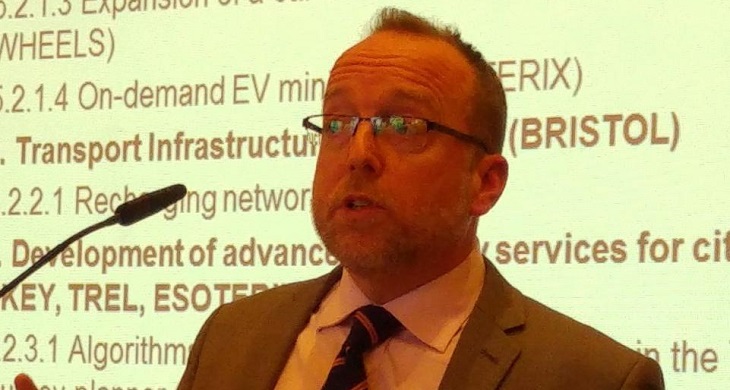
Alice Pengelly from the Clean Air Champions team spoke to Kevin O’Malley at Innovate UK to find out how they are supporting the development of cutting-edge technology to tackle air pollution.
As Innovation Lead at Innovate UK, Kevin manages their Clean Air Programme projects. This means he seeks out innovative new technologies that could help cut air pollution.
So far, as part of Wave 1 of the Clean Air Programme, six projects have been funded for feasibility studies, with three of those further funded for in depth prototyping and testing work.
Eleven more feasibility studies have been funded in Wave 2, with five of those going forward to more involved research and testing. These were chosen through a competitive selection process using the pre-commercial procurement instrument, Small Business Research Initiative (SBRI).
Each offer solutions to different sources of air pollution that can be bad for our health. They are summarised below.
“The innovations emerging are fascinating,” says Kevin. “As a technophile I’m inspired by the creativity of new engineering. It satisfies me enormously to think I’ve played a small part in growing innovative UK businesses, improving air quality, and protecting vulnerable people’s health.”
Efficient food delivery
Delivery vans for chilled and frozen food have substantial emissions, as they not only use energy to transport the food, but also to keep it cool.
Cool Run pods could greatly increase the efficiency of this process, reducing, or even entirely eliminating, the emissions from the secondary diesel engines used to power refrigeration. Instead of cooling the whole vehicle, the pods can be transported in ordinary vans. Only one pod needs to be opened at one time, so food in the other pods remains cold and does not need to be re-chilled.
Preventing poor wheel alignment
Misaligned wheels increase a vehicle’s tyre wear, a major source of particulate matter, as well as additional unnecessary fuel consumption. Often drivers are unaware of the problem, meaning it is not corrected for a long time.
Fine particulate matter (PM2.5) can penetrate through the lungs and enter the body through the blood stream, affecting all major organs.This can lead to diseases affecting the lungs, heart and circulatory system, such as lung cancer, chronic obstructive pulmonary disease (COPD) and stroke. It may also stunt children’s development – research has shown an association between high levels of air pollution in pregnancy and developmental delay at age three.
Auto-Align is a real-time alignment measurement system that means vehicle owners are alerted when their wheels are out of alignment. This means they can quickly fix it, reducing tyre wear and the associated particulate emissions.
Reducing construction site emissions
Construction sites usually use a diesel generator to power their on-site facilities for workers. This creates harmful air pollution. The CAGE project combined a new ultra low emission 6kW bioLPG generator with a solar-battery hybrid power system.
This reduced CO2 emissions by 70-95% compared to diesel generators, with similar reductions in emissions harmful to health. Since the project finished, a new hydrogen version of the hybrid system has been developed for trial with zero emissions.
Future innovations
For Wave 2 of the programme, Kevin is focussing on indoor air quality monitoring systems, and on technologies to remove harmful pollutants from the atmosphere.
The Measure, Inform, Nudge project is developing a platform that will help households manage their indoor air quality, using an easy-to-use and intuitive smart phone application or website. This will monitor the levels of key pollutants in the home, such as particulate matter and volatile organic compounds. It will then use this to provide actionable recommendations to householders, helping them reduce the health impacts of long term exposure to these pollutants.
Similarly, the Smarter Home project will develop an ultrasensitive home-based indoor air quality sensing system that can detect harmful levels of pollution, predict and identify the pollution sources, and provide suggestions to help people improve air quality in their homes.
FamilyAIR will develop a cost effective, human centred air quality monitoring system that engages with each member of a family personally, helping them understand and improve air quality within their home.
The Codikoat project is developing a novel filter technology designed to remove small particulates (PM2.5), SO2 and NOx from the domestic atmosphere, while the Immaterial project is working to employ filtration materials called metal-organic frameworks with to extract pollutants from the home.
Together, these projects will help people improve air quality in their homes.
“Breathing clean air will massively improve the quality of life, but more importantly the life and longevity of everyone in the UK. The lives of those with compromised breathing, or diseases such as asthma or COPD, will be particularly improved,” said Kevin.
“In addition to this though, a flourishing Clean Air Technology Sector in the UK will also develop sustainable, high quality jobs for the UK population.”